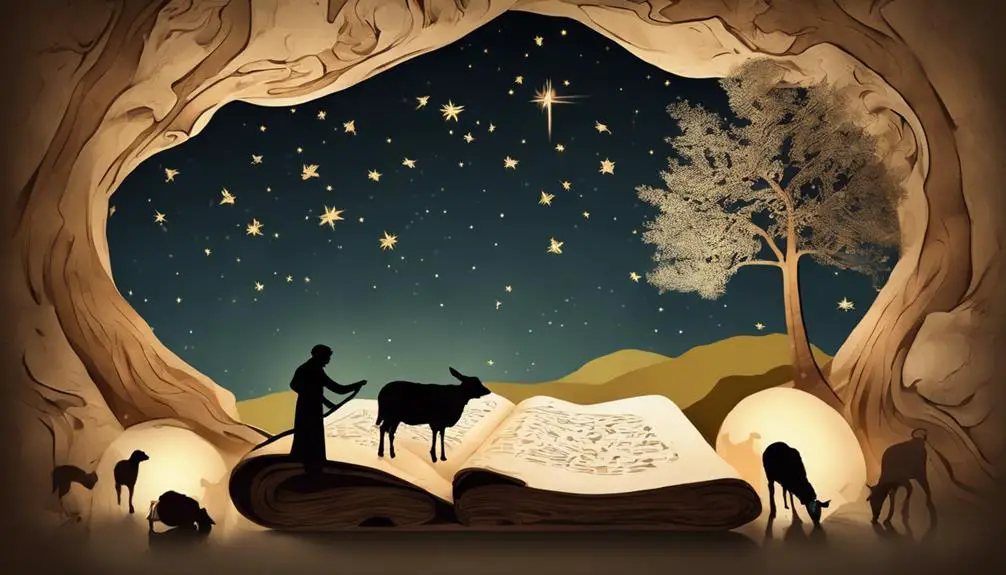Hidden in biblical tales, the number 20 unfolds as a symbol of redemption and trials, inviting a deeper exploration of its spiritual significance.

Meaning of 20 in the Bible
As you embark on a journey through the winding paths of biblical numerology, the number 20 emerges as a beacon of redemption and waiting. It's intricately woven into the fabric of scriptural narratives, from the 20 shekels of silver that speak volumes of betrayal and reconciliation to the less obvious, yet equally profound, periods of waiting that test and refine faith.
This exploration invites you to uncover the layers of meaning behind this seemingly ordinary number, revealing insights into spiritual journeys that resonate far beyond the pages of ancient texts. Let's set the stage for a discussion that promises to illuminate the significance of 20 in the Bible, beckoning you to engage with timeless lessons hidden within.
Key Takeaways
- The number 20 symbolizes redemption and hope in biblical narratives, often linked with sacrificial offerings and covenant renewal.
- It represents a significant waiting period that is seen as a time for preparation, anticipation, and strengthening of faith before divine intervention.
- In the story of Joseph, the transaction of 20 shekels of silver not only reflects the market value of a slave but also underscores the commodification of human life.
- The use of the number 20 in biblical stories emphasizes personal growth and perseverance, marking waiting periods as pivotal moments for spiritual evolution.
Symbolism of Redemption

In the context of biblical numerology, the number 20 symbolizes redemption, offering a profound insight into the structure and themes of biblical texts. This symbolism is intricately linked with sacrificial offerings and covenant renewal, elements that are foundational to understanding the dynamics of redemption in the scripture.
When you delve deeper into the biblical narrative, you'll find that the number 20 doesn't just arbitrarily signify redemption; it's woven into the fabric of the narrative through concrete examples.
For instance, sacrificial offerings, which were a pivotal aspect of the Old Testament's religious practices, often involved specific guidelines that implicitly or explicitly included the number 20. These offerings weren't merely ritualistic; they symbolized a deeper act of atonement, aiming to renew and restore the relationship between humanity and the divine. Similarly, covenant renewal ceremonies, which were critical to reaffirming the bond between God and His people, frequently incorporated the number 20 to underscore the significance of redemption and the promise of restoration.
Through these examples, it's clear that the number 20's association with redemption isn't coincidental but a carefully structured element that reinforces the bible's overarching message of hope and renewal.
The Waiting Period
You'll find that the number 20 also signifies a period of waiting, a theme deeply embedded within the biblical narrative, reflecting a time of preparation and anticipation for divine intervention. This waiting period isn't merely a pause but a significant phase that serves multiple purposes:
- Testing of Patience: The wait is often a test of one's endurance and faith. It's a period that questions your resolve and strengthens your spirit, embodying the essence of patience testing.
- Preparation of the Heart: This time allows for introspection and spiritual readiness, ensuring that you're prepared for what's to come. It's about aligning your heart with divine timing.
- Strengthening of Faith: The longer the wait, the more your faith is challenged and ultimately fortified. It's a crucial time for spiritual growth and reliance on a power greater than oneself.
- Divine Timing: Understanding that everything occurs according to divine timing is essential. This period teaches that no matter one's desires, the unfolding of events will align with a greater plan, emphasizing trust in the process.
Through these aspects, the biblical significance of 20 as a waiting period isn't just about the time spent but the profound transformation and readiness it cultivates for divine intervention.
Examples in Biblical Narratives

Reflecting on the significance of the number 20 as a period of waiting, let's now explore its manifestation within specific biblical narratives, where this symbolic meaning comes to life through the experiences of key figures. Jacob's service under Laban is a quintessential example. For 20 years, Jacob labored, enduring hardship and deception, ultimately emerging with personal growth and significant wealth. This period wasn't just a literal waiting but a transformative journey, encapsulating the essence of patience and perseverance that 20 can symbolize.
Similarly, Samson's strength, though not directly linked to a 20-year time frame, aligns with the thematic elements of testing and preparation associated with the number. His life, marked by phases of triumph and tribulation, reflects the cyclical nature of spiritual and physical strength, resonating with the broader implications of waiting and maturity that the number 20 can signify in biblical contexts.
These narratives underscore the multifaceted symbolism of 20, weaving it into the fabric of biblical history as a marker of time that's both literal and metaphorical, a waiting period that precedes significant change or revelation.
The 20 Shekels of Silver
Delving into another noteworthy instance, the transaction involving 20 shekels of silver profoundly illustrates the biblical valuation of human life and destiny, particularly through the story of Joseph being sold into slavery by his brothers.
- Historical Context: The sum of 20 shekels of silver wasn't arbitrary. It mirrored the market value of a slave during that period. This amount contextualizes Joseph's story within the socio-economic practices of the time, offering a glimpse into the valuation of human life in ancient Near Eastern societies.
- Symbolic Significance: Beyond its monetary value, this transaction symbolizes the commodification of human life, underscoring themes of betrayal and redemption that are central to Joseph's narrative.
- Economic Insights: The use of silver as currency reflects the economic structures of the time, where transactions, even those involving human lives, were quantified and facilitated through tangible assets.
- Narrative Impact: This specific numeral, 20, gains significance within the biblical narrative by marking a pivotal moment in Joseph's life, setting forth a journey of trials, growth, and eventual elevation.
These elements together craft a multifaceted understanding of the 20 shekels of silver, embedding it deeply within both the historical context and the spiritual fabric of the biblical text.
Reflections on Spiritual Journeys

Building on the understanding of the 20 shekels of silver and its implications for human value and destiny, let's explore how these themes underpin broader spiritual journeys within the biblical narrative. This figure isn't just a transactional value; it's a symbol of the profound inner growth that you're invited to undergo. The biblical stories are replete with instances of individuals and communities who encounter divine moments, each of these encounters serving as a catalyst for transformation.
Your spiritual journey, much like those depicted in the scriptures, is marked by moments of divine encounters that prompt deep reflection and growth. It's in these moments that the value of 20 shekels transcends its monetary significance, becoming a metaphor for the worth and potential of your spiritual path. These narratives encourage you to look beyond the surface, to see the potential for divine interaction in every aspect of your life.
As you navigate your spiritual journey, remember that each step, each challenge, and each victory contributes to your inner growth. The biblical stories highlight that divine encounters aren't just historical events but are reflective of the ongoing spiritual evolution you're called to.
Frequently Asked Questions
How Does the Number 20 Compare to Other Significant Numbers in the Bible, Such as 7 or 12, in Terms of Its Frequency of Mention and Importance?
In exploring numerical symbolism in biblical numerology, you'll find that 20 isn't mentioned as frequently or holds as pivotal a role as numbers like 7 or 12. These latter figures appear extensively, symbolizing completeness and divine order, respectively.
While 20 does emerge, its significance and occurrence pale in comparison. This comparison underscores the layered complexity and hierarchical significance of numbers within scriptural texts, making some figures more central to theological interpretations than others.
Are There Any Specific Prayers, Psalms, or Prophecies in the Bible That Directly Reference the Number 20, Outside of Narrative Contexts?
Interestingly, you won't find specific prayers, psalms, or prophecies highlighting the number 20 in a direct, isolated manner. Unlike other numbers steeped in numerical symbolism, 20 doesn't emerge prominently in prayer patterns or prophetic writings.
This absence itself invites a closer look, urging you to delve deeper into the fabric of biblical numerology. It's a subtle invitation to explore beyond surface-level appearances and uncover underlying connections within the scripture's vast landscape.
In Modern Biblical Scholarship, How Is the Number 20 Interpreted or Understood Differently Compared to Traditional Interpretations?
In modern biblical scholarship, the number 20's significance often diverges from traditional views. Scholars now place a stronger emphasis on numerical symbolism, analyzing contemporary interpretations through a more analytical lens. This approach recontextualizes the number, moving beyond literal counts to explore its symbolic meanings within various texts.
You're seeing a shift towards understanding how these figures convey deeper, contextual messages rather than just serving as historical or narrative markers.
Can the Number 20 Be Linked to Any Specific Events or Figures in the New Testament, Given Its Apparent Old Testament Significance?
You're venturing into the New Testament, seeking significant sightings of the number 20. While it's vivid in the Old Testament, think Jacob's wages and Temple dimensions, its New Testament nods aren't as numerous.
Yet, this doesn't diminish its depth; rather, it challenges scholars to dig deeper into textual contexts and traditions. Analytically, one might argue that its scarcity in explicit events or figures encourages a broader, more interpretative exploration of biblical numerology.
How Has the Symbolism of the Number 20 Influenced Christian Art, Architecture, or Literature Throughout History?
You'll find that numerical symbolism, especially the use of the number 20, has deeply influenced Christian art, architecture, and literature. This impact reflects in artistic representations, where the number often symbolizes completeness or a period of waiting.
Scholars analyze these elements to understand their contextual significance, tracing how this symbolism has shaped expressions of faith and devotion. The presence of the number 20 in such works offers insights into historical and theological narratives.
Conclusion
In concluding, the number 20 in the Bible symbolizes both redemption and a period of waiting, a concept deeply embedded in various narratives.
Through the example of the 20 shekels of silver, it's evident that this number isn't arbitrary but carries profound spiritual significance.
Your journey through these biblical instances isn't just an academic exercise; it's a personal exploration into the depths of redemption and patience, inviting you to reflect on these themes in your own spiritual walk.



Sign up